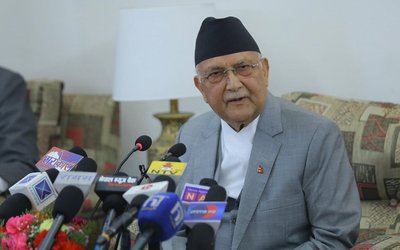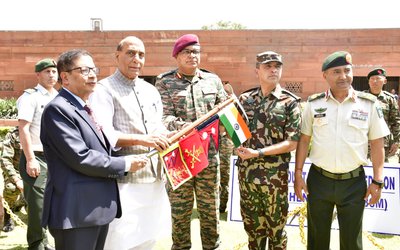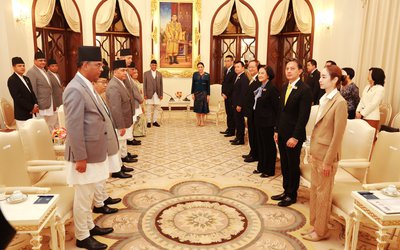More on National



“The court will not allow any corrupt person to walk free and it will deal with corruption related issues in accordance with the laws. My recent judgment was based on precedents and verdicts delivered by the apex court in the past,” said Justice Sushila Karki, talking to Nagarik Daily, following the judgment against sitting minister Jaya Prakash Gupta on corruption charges.
The Supreme Court’s division bench headed by Justice Karki and Justice Tarka Raj Bhatta handed out a one and a half year’s jail sentence and Rs 8.5 million in fines to sitting Minister for Information and Communications Jay Prakash (JP) Gupta. The Commission for Investigation of Abuse of Authority (CIAA) had first filed charges against Gupta in 2002. The Special Court had issued a clean chit to Gupta in 2007. CIAA again filed a writ petition at the apex court as it sought a review over the Special Court's verdict.
Terming the verdict of the Special Court giving clean chit to JP Gupta erroneous, the Supreme Court directed the Judicial Council to punish judges Bhoop Dhoj Adhikari, Cholendra SJB Rana and Komal Prasad Ghimire.
Gupta is not the first politician proven guilty on corruption. Last year, the Supreme Court had sentenced former minister Chiranjibi Wagle to one and a half year’s jail term and a fine of Rs 20.3 million after finding him guilty on corruption charges. A division bench of Chief Justice Ram Prasad Shrestha and Khil Raj Regmi delivered the judgment in March 2011.
The only question is: are the judgments based on the rule of law or on individual whim?
“Had not I dreamt of the god, the night before the verdict, I would not have inspiration to send former minister Chiranjibi Wagle to prison,” former chief justice Ram Prasad Shrestha declared in a public meeting organised to bid a farewell to him. “I was directed by god to deliver the verdict.”
Shrestha had openly made this statement in front of Nepal’s prominent figures including judges, former bureaucrats and civil society members. However, no one raised the question: can a verdict directed by spiritual inclinations be valid. Similarly, the bench headed by chief justice Khil Raj Regmi directed the Special Court to re-hear the cases cleared by it on the ground of retrospective action. The bench ordered that the retrospective precedents cannot be applied in corruption related cases.
No society can tolerate corruption and no one can defend the corrupt people handed punishments guided by rule of law. However, Nepal’s court system is often guided by political and populist considerations. Nepal’s Supreme Court rejected to listen to the hearing on the political declaration of reinstated House of Representatives in 2006. The declaration deactivated all the constitutional provisions.
Given Nepal’s previous records, the anti-corruption drive is often guided by political and individual whims rather than the firm commitments against corruption. From former prime minister and Nepali Congress supremo Girija Prasad Koirala to former ministers, bureaucrats and judges, most of those accused as involved in corruption scandals have linkages with Nepali Congress.
Although CIAA inquired two dozen ministers and filed the cases against a dozen, the commission chief handed a letter of clean chit to late Koirala after janandolan II.
During former King Gyanendra’s direct rule, a high-level Anti-Corruption Commission even sent former prime minister Sher Bahadur Deuba, Nepali Congress general secretary Prakash Man Singh and CPN-UML leader Ishwor Pokharel to prison. Following the apex court’s verdict on the high level commission, former prime minister Deuba, Singh and Pokharel were acquitted from the scandal.
Even during the Panchayat days, former prime minister Dr.Tulsi Giri, former ministers late Dr. Harka Gurung, Dr. Bekha Bahadur Thapa and many senior high officials were accused in corruption charges.




